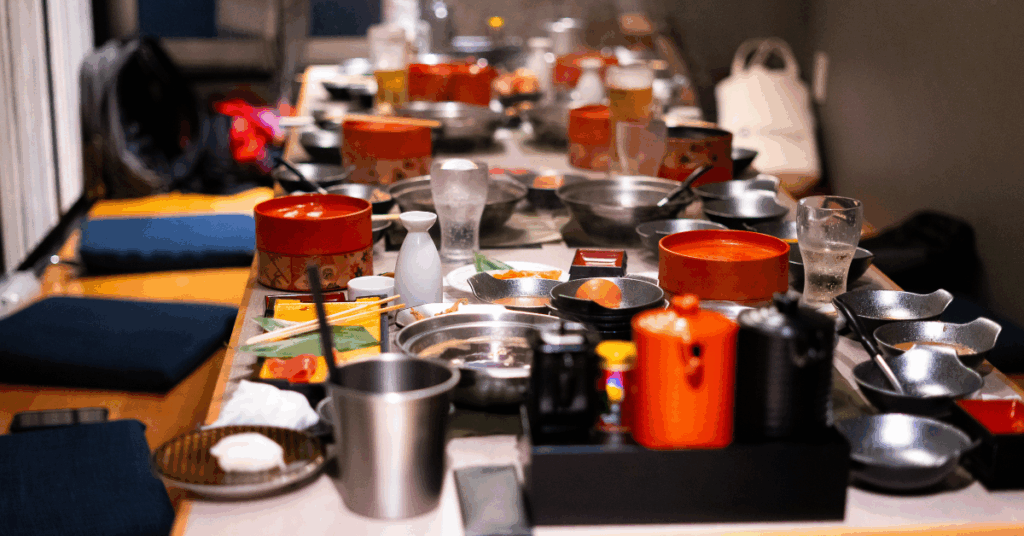“Halal” is an Arabic term that means “lawful” or “permissible.” While it refers to anything in Islam, it generally is used in relation to food and dietary guidelines. Although halal food used to be quite difficult to find in Japan, things have changed for the better and it is easier to find it now.
Access to halal-friendly food varies across Japan, depending on where you’re staying. Of course, Tokyo is one of the easiest places to find it, being an international hub.
This guide will cover:
- Halal restaurants in Japan: Learn how to find halal-certified or Muslim-friendly restaurants.
- Groceries and home cooking: Discover where to buy halal meat and ingredients, read Japanese labels, and prepare affordable meals at home.
- Apps and tools: Use Halal Gourmet Japan, barcode scanners, and online communities to easily locate halal food and prayer spaces.
- Daily life tips: Navigate ingredient checks, hidden alcohol, convenience store options, and social situations with ease.
- Prayer spaces: Find prayer rooms in airports, malls, train stations, and mosques to support daily religious practices.

What is halal like in Japan today?
Japan’s halal scene has grown rapidly in recent years, driven by rising inbound tourism and an increasing number of international students and residents. While the country still isn’t a fully halal-friendly destination, it’s now much easier to find suitable dining and shopping options than it was a decade ago.
It’s also important to understand the different labels you’ll come across. Halal-certified restaurants are officially approved by recognized organizations and follow strict standards. Muslim-friendly spots don’t have full certification, but they do make an effort to use halal ingredients or offer clearly marked halal dishes. Some restaurants simply advertise “no pork” or “no alcohol,” which can be useful, but doesn’t guarantee full halal compliance. Vegan and vegetarian restaurants can also serve as reliable alternatives, though you should still confirm that broths, seasonings, or sauces don’t contain hidden animal products or alcohol. (A “vegan” label in Japan does not necessarily mean that it doesn’t contain any animal products).
Access to halal food varies widely by region. Major cities like Tokyo, Osaka, and Kyoto have the strongest infrastructure, with many halal-certified restaurants, Muslim-owned shops, and international grocery stores. In contrast, those living in or visiting rural areas will need more planning, often relying on seafood restaurants, vegan cafes, or home cooking with halal ingredients that have been previously purchased online.
Your essential tool to eating halal: Halal Gourmet Japan
When it comes to finding halal food in Japan, Halal Gourmet Japan is the most reliable tool available. The website and app offer a comprehensive directory of halal-certified restaurants, Muslim-friendly eateries, grocery stores, even prayer spaces across the country, and even Japan’s top ten Muslim-friendly cities. It’s widely regarded as the most complete halal database in Japan, with detailed listings that are regularly updated.
The platform’s filters make searching simple and accurate. You can sort by halal-certified, Muslim-friendly, no pork, no alcohol, vegan, vegetarian, restaurants with prayer rooms, and more. These comprehensive search options make it quicker and easier for you to find exactly what you’re looking for, without having to dig through lists of different places.
For visitors, Halal Gourmet Japan works perfectly on-the-go: you can check what’s nearby while sightseeing, look up halal options around popular attractions, and easily navigate unfamiliar neighborhoods. For residents, it’s equally valuable — use it to discover new shops or restaurants opening in your area, compare halal grocery sources, or plan meals for special occasions.
One of its most useful features for daily life is the barcode scanner, which allows you to check the halal status of packaged food products before purchasing. This is especially helpful for residents who regularly shop at Japanese supermarkets and want quick reassurance about ingredients.

What are some popular halal Japanese foods?
Japan now offers more halal-friendly food options than ever, making it easier to enjoy iconic dishes without compromising your beliefs. You can try halal wagyu and yakiniku, where premium beef is sourced and prepared according to halal standards. Halal ramen shops recreate the rich, comforting flavors of classic ramen using chicken, seafood, or plant-based broths instead of pork. Many cities also have halal shabu-shabu restaurants, giving you a great way to enjoy this popular hotpot meal.
Seafood-based dishes like sushi are naturally simpler to navigate. However, dashi — a popular Japanese broth made from bonito flakes — can sometimes contain mirin, a rice wine used in cooking. Dashi is also commonly used in Japanese cooking, in soups, sauces, and even some seasonings. When in doubt, check ahead or confirm with the staff.
You’ll also find halal or Muslim-friendly versions of everyday Japanese favorites, including curry rice, tempura, donburi bowls, and ready-to-eat bento sets, making it easier for anyone to enjoy Japan’s food culture.
How can I eat halal as a foreign resident in Japan?
Living in Japan as a Muslim resident or student comes with its own set of challenges — but with a few strategies, you can enjoy halal meals every day without stress.
Groceries and home cooking
For residents, cooking at home is often the most reliable way to maintain a halal diet. You can buy halal meat from Muslim-run halal shops, many Asian supermarkets, and even through online delivery services that ship nationwide. Learning to read Japanese ingredient labels is crucial — watch out for key terms like 豚 (pork), ゼラチン (gelatin), 酒 (alcohol), and other hidden non-halal additives.
Many mainstream supermarkets such as Aeon, Don Quijote, and Gyomu Super now carry a selection of halal-friendly items, like noodles, sauces, and frozen foods. Residents often rely on convenient staples like rice, canned beans, tofu, frozen vegetables, and halal-certified snacks to make daily meal prep easier. Freezing meat in portions and batch cooking can save time and money, ensuring you always have enough halal options ready for lunch, dinner, or any snacking time in between.
Affordable options for students and residents
Eating halal in Japan doesn’t have to be expensive. Vegan and seafood restaurants can serve as reliable daily alternatives when halal meat isn’t available. Many casual eateries, curry shops, and smaller restaurants also offer cheap halal-friendly meals, making it easier for students and budget-conscious residents to eat out occasionally.
Budgeting is key: halal-certified restaurants generally cost more than standard eateries, so combining home cooking with occasional restaurant meals is the most cost-effective approach. Over time, residents often create a routine that balances convenience, nutrition, and affordability as their way of making halal living in Japan both manageable and enjoyable.

What are some practical tips for eating halal in Japan?
Eating halal in Japan can be straightforward once you know a few key tips and phrases. Learning some simple Japanese can make a big difference. Use expressions like “豚は入っていますか?(Buta wa haitte imasu ka?)” to ask if a dish contains pork, “アルコールは入っていますか?(Arukōru wa haitte imasu ka?)” to check for alcohol, and always ask about broths or sauces to confirm that they are halal-friendly.
Even when a restaurant claims to be halal or “no pork,” it’s wise to double check. Many dishes contain dashi, which may or may not be halal. Asking specifically about the type of dashi or checking ingredient lists can prevent unintentional mistakes. Similarly, “alcohol-free” on menus in Japan sometimes only means the drink itself doesn’t contain alcohol, but alcohol may still be used in cooking, marinades, or sauces, so a quick confirmation is always helpful.
For group outings where not everyone follows a halal diet, plan ahead by choosing restaurants with a mix of halal and non-halal options. You can also suggest dishes that naturally meet halal requirements, like grilled meats or vegetable-based meals.
At school or work, bento boxes and lunch culture are common. Many ready-made bento options contain pork, chicken in non-halal sauces, or hidden alcohol, so it’s helpful to either prepare your own meals or identify local stores that sell halal-ready bento and snacks. Over time, building a list of safe meals, favorite restaurants, and go-to grocery items makes daily halal living in Japan much easier.

Prayer spaces in Japan
Finding a place to pray while living in or visiting Japan is easier than many expect, especially in major cities. Many airports, large shopping malls, and select restaurants now offer dedicated prayer rooms, making it convenient to maintain daily prayers even while out and about.
Japan also has a growing network of mosques, many of which are located near halal shops, restaurants, or community centers, providing both spiritual support and access to Muslim-friendly food. Even outside major cities, mosques often act as community hubs, helping residents and students connect with local resources.
Several apps and websites make locating prayer spaces quick and simple. Platforms like Halal Gourmet Japan, Muslim Pro, Halal Recipes Japan, and local Muslim community websites provide up-to-date information on nearby mosques, halal-friendly eateries, and available prayer rooms, ensuring you can plan your day with ease.
Living and eating halal in Japan
Eating halal in Japan is easier than many people expect. With more halal-certified restaurants, grocery stores, and convenient apps, as well as prayer spaces, it’s possible to enjoy Japanese food while sticking to your dietary and religious needs. With the right resources and routines, living or studying abroad in Japan while eating halal can be practical, enjoyable, and an excellent way to experience Japanese culture.
Want to learn more about life in Japan? Check out our blog for more info and tips!




